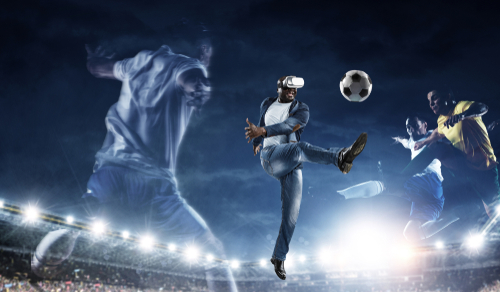Mixed reality’s joining the sports world as the increased interest in competitive gaming is pushing companies to move beyond the physical realm.
Mixed reality, the combination of both virtual reality and augmented reality, allows objects from the real, physical world to intermingle with digital objects. Sports company Arcadia, known for augmented reality, is one of the companies adding in virtual headsets and hand controllers to give competitive gamers a mixed reality experience.
Ten players must maneuver themselves around each other while trying to overcome VR obstacles ranging from moving platforms and gaping holes. They’re given the opportunity to run physically through Samos Arena, a basketball-court-sized area —roughly 10,000 square feet, while immersed in this VR environment. By allowing them to tackle and dodge other players, Arcadia mixes the physical aspect of traditional sports with VR and AR to create competitive mixed reality sports. To make the concept more enticing, they bring popular culture to the mix.
They offer customers the opportunity to play in simulations inspired by movies such as Tron. This July they worked with Warner Bros. to create “Space Jam: New Legacy, Real,” a game that puts players in a virtual basketball court similar to the virtual one in the movie.
While the idea behind Arcadia and the company itself are still viewed as part of an entertainment service, they have plans to transform it into a new sport- one as widely celebrated as basketball and football.
“The endgame is that this is a dominant category of sport,” said co-founder Jeremy Sholzberg in conversation with Digiday. “You can go with friends to the local gym, or a local school or community center and play a pick-up game.” LVL, a gaming venue based in Berlin, is looking to emulate Arcadia’s mixed reality sports concept. The company’s working with the United Nations Population Fund, known simply as UNFPA, to set underway a new project called Das Race Goal. Players of Das Race Goal are allowed to play a real-world version of the popular automotive soccer game, Rocket League, with remote-controlled cars.
According to the CEO of LVL, Thomas Fellger, the program will move towards adding in VR obstacles and power-ups. These new additions will allow them to create something closer to Arcadia. The increased interest in mixed reality sports comes because of a rising interest in the VR Winter Games and the VR Summer Games. Hosted by the Virtual Athletics League, also known as VAL, this event offers players a chance to compete for cash prizes by participating in mixed reality games.
For thousands of dollars in prizes, participants need to advance from games like Rock Fighter where they avoid flying pizza boxes to higher level games like Ball to the Wall where they hit rocks with the same-colored balls by tugging on levers. This year marked the fifth VR Summer Games. It brought out over 10,000 VR athletes and gave away $20,000 in prizes.








